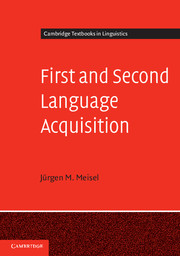Book contents
- Frontmatter
- Contents
- List of figures
- List of tables
- Preface
- List of abbreviations
- 1 The quest for the LAD
- 2 First language development: Universal Grammar as the centrepiece of the human language making capacity
- 3 Obvious (observable) similarities and differences between first and second language acquisition: Developmental sequences
- 4 The initial state and beyond
- 5 Developing grammatical knowledge: Parameter setting and inductive learning
- 6 Neural maturation and age: Opening and closing windows of opportunities
- 7 A (tentative) theory of language acquisition – L1, 2L1 and L2
- Glossary
- Notes
- References
- Index
- References
2 - First language development: Universal Grammar as the centrepiece of the human language making capacity
Published online by Cambridge University Press: 05 June 2012
- Frontmatter
- Contents
- List of figures
- List of tables
- Preface
- List of abbreviations
- 1 The quest for the LAD
- 2 First language development: Universal Grammar as the centrepiece of the human language making capacity
- 3 Obvious (observable) similarities and differences between first and second language acquisition: Developmental sequences
- 4 The initial state and beyond
- 5 Developing grammatical knowledge: Parameter setting and inductive learning
- 6 Neural maturation and age: Opening and closing windows of opportunities
- 7 A (tentative) theory of language acquisition – L1, 2L1 and L2
- Glossary
- Notes
- References
- Index
- References
Summary
Universal Grammar and the LAD
The gift for language which manifests itself in the effortless acquisition of language by toddlers can safely be qualified as a species-specific endowment of humans. In fact, it enables children to develop a full grammatical competence of the languages they are exposed to, independently of individual properties like intelligence, personality, strength of memory and so on, or of particularities of the learning environment, for example social settings, whether the child is an only child or has siblings, birth order among siblings, whether the child has one or more primary caregivers, communicative styles of parents or caregivers, and so forth. These specific characteristics of the individual and of the setting in which language acquisition happens may determine the extent of the linguistic skills that enable people to express themselves in more or less elaborate ways when using language. But, except for pathological cases, for example children who suffer from brain damage, one will never find native speakers who acquired incomplete grammatical knowledge of their language. For example, we do not find individuals unable to use passive constructions because their intelligence is below average, or individuals who do not comprehend embedded clauses because their parents did not use enough embedded clauses when speaking to them.
These observations should be uncontroversial. Yet as soon as one sets out to describe more specifically the nature of the language capacity common to all humans, it becomes immediately obvious that many of the issues arising in this discussion are the object of much controversy.
- Type
- Chapter
- Information
- First and Second Language AcquisitionParallels and Differences, pp. 13 - 61Publisher: Cambridge University PressPrint publication year: 2011



